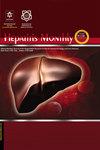TLR3介导肝星状细胞衰老和免疫监测
IF 0.6
4区 医学
Q4 GASTROENTEROLOGY & HEPATOLOGY
引用次数: 0
摘要
背景:肝星状细胞(HSCs)的活化是肝纤维化的重要驱动因素,肝纤维化是全球关注的健康问题,目前尚无有效的解决方案。衰老激活的HSC优先被自然杀伤细胞(NK细胞)杀死,以促进肝纤维化的消退。目的:本研究的目的是研究聚肌苷酸(poly I:C)对HSC衰老的影响,这是NK细胞诱导的细胞毒性的触发因素。方法:通过蛋白质印迹、qRT-PCR和流式细胞术评估HSC的衰老,并通过测量CD107a的表达来评估NK细胞与poly I:C处理的HSC的共培养中的NK细胞毒性。结果:p16、p21、SA-β-gal、MICA/MICB和ULBP2在poly I:C处理的HSC中的表达增加,使其对NK细胞的细胞毒性显著敏感。结论:Poly I:C诱导HSC细胞衰老并触发NK细胞免疫监测,提示Poly I:C在HSC衰老中的作用可能促进纤维化消退。本文章由计算机程序翻译,如有差异,请以英文原文为准。
TLR3 Mediates Senescence and Immunosurveillance of Hepatic Stellate Cells
Background: Activation of hepatic stellate cells (HSCs) is an important driver of liver fibrosis, which is a health problem of global concern, and there is no effective solution for it at the present. Senescent activated HSCs are preferentially killed by natural killer cells (NK cells) to promote the regression of hepatic fibrosis. Objectives: The purpose of this study was to investigate the effect of polyinosinic-polycytidylic acid (poly I:C) on HSCs’ senescence, a trigger for NK cell-induced cytotoxicity. Methods: The senescence of HSCs was assessed by western blot, qRT-PCR, and flow cytometry, and NK cell cytotoxicity was assessed in a co-culture of NK cells with poly I:C-treated HSCs by measuring CD107a expression. Results: The expression of p16, p21, SA-β-gal, MICA/MICB, and ULBP2 increased in poly I:C-treated HSCs, rendering them significantly susceptible to NK cell cytotoxicity. Conclusions: Poly I:C induces cellular senescence in HSCs and triggers NK cell immunosurveillance, suggesting that the role of poly I:C in HSC senescence may promote fibrosis regression.
求助全文
通过发布文献求助,成功后即可免费获取论文全文。
去求助
来源期刊

Hepatitis Monthly
医学-胃肠肝病学
CiteScore
1.50
自引率
0.00%
发文量
31
审稿时长
3 months
期刊介绍:
Hepatitis Monthly is a clinical journal which is informative to all practitioners like gastroenterologists, hepatologists and infectious disease specialists and internists. This authoritative clinical journal was founded by Professor Seyed-Moayed Alavian in 2002. The Journal context is devoted to the particular compilation of the latest worldwide and interdisciplinary approach and findings including original manuscripts, meta-analyses and reviews, health economic papers, debates and consensus statements of the clinical relevance of hepatological field especially liver diseases. In addition, consensus evidential reports not only highlight the new observations, original research, and results accompanied by innovative treatments and all the other relevant topics but also include highlighting disease mechanisms or important clinical observations and letters on articles published in the journal.
 求助内容:
求助内容: 应助结果提醒方式:
应助结果提醒方式:


